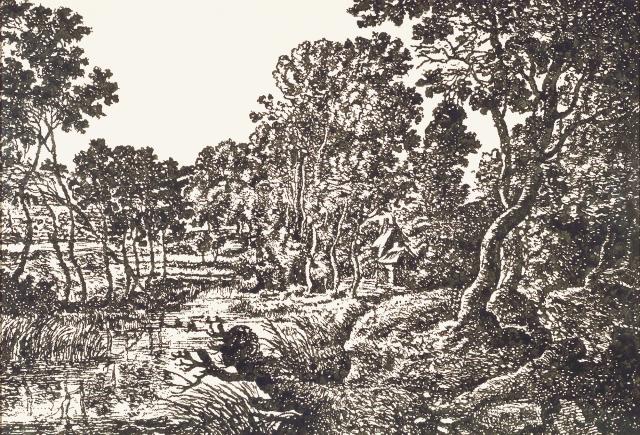Ugo Rondinone’s initial large-format Indian ink drawings date from the early 1990s. These works feature views of idyllic landscapes showing wooded hills emerging from the mist of rural, bucolic surroundings in which only a few cottages suggest a human presence. The drawings seem to arise from some proto-industrial age.
In the black and white of their ghostly appearance, Rondinone’s renderings of a garden in Arcadia are infused with melancholia, a melancholia of the sublime, that of the Romantic tradition of landscape. They are like interrupted dreams – time has ceased to pass there, caught in the gnarled trees, prisoner of an unreal nature and haunted by the nostalgic spirit of the site. To make it easier for viewers to enter these drawings, they become paintings, immense pictures on a human scale. And yet, in counterpoint, they refer repeatedly to the old small-format engraving of the seventeenth and eighteenth centuries.
Under the influence of that combination of techniques and quotations, absence of colours, and motifs that are occasionally rendered in negative, the artist draws what could be called memories of landscapes, more psychic than tangible, partners of a fantastical world. Piling up the references, Rondinone recomposes an image that seems familiar but whose pastoral scene has been deliberately omitted, as if to startle the viewer and leave only hints of a presence, a possible history, a history that remains to be invented.
By choosing a title that typographically states the date when the drawing was created, Rondinone links this timeless landscape to a precise day from his own life. He fixes that instant and anchors the reference to the past in a specific moment today. As David Thorp has pointed out, “At the heart of Rondinone’s practice is a resigned, melancholic acceptance of a world in which beauty still remains a redeeming feature”.
In the black and white of their ghostly appearance, Rondinone’s renderings of a garden in Arcadia are infused with melancholia, a melancholia of the sublime, that of the Romantic tradition of landscape. They are like interrupted dreams – time has ceased to pass there, caught in the gnarled trees, prisoner of an unreal nature and haunted by the nostalgic spirit of the site. To make it easier for viewers to enter these drawings, they become paintings, immense pictures on a human scale. And yet, in counterpoint, they refer repeatedly to the old small-format engraving of the seventeenth and eighteenth centuries.
Under the influence of that combination of techniques and quotations, absence of colours, and motifs that are occasionally rendered in negative, the artist draws what could be called memories of landscapes, more psychic than tangible, partners of a fantastical world. Piling up the references, Rondinone recomposes an image that seems familiar but whose pastoral scene has been deliberately omitted, as if to startle the viewer and leave only hints of a presence, a possible history, a history that remains to be invented.
By choosing a title that typographically states the date when the drawing was created, Rondinone links this timeless landscape to a precise day from his own life. He fixes that instant and anchors the reference to the past in a specific moment today. As David Thorp has pointed out, “At the heart of Rondinone’s practice is a resigned, melancholic acceptance of a world in which beauty still remains a redeeming feature”.
